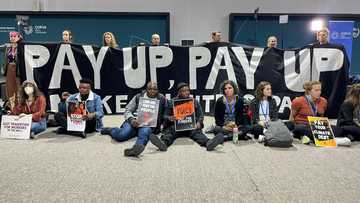Taxing the richest: what the G20 decided

Source: AFP
Anti-poverty campaigners have hailed a decision by G20 leaders meeting in Rio to make sure the world's billionaires "are effectively taxed."
Getting the super-rich to cough up more in taxes has been a priority of left-wing Brazilian President Luiz Inacio Lula da Silva, who is hosting the summit of the world's biggest economies.
How much tax do billionaires pay?
Lula, a former metalworker who grew up in poverty, complains that the super-rich pay proportionately much less tax than the working class.
A 2021 White House study showed that the wealthiest 400 billionaire families in the US paid an average federal individual tax rate of 8.2 percent, compared to 13 percent for the average taxpayer.
According to anti-poverty NGO Oxfam, the richest 1 percent have accumulated $42 trillion in new wealth over the past decade
It says the richest one percent have more wealth than the lowest 95 percent combined.
Increasing taxes on the wealthiest is also seen as a way to boost state coffers at a time of ballooning budget deficits and as developing countries seek huge amounts of funding to help them weather global warming.
"Tax the rich" has for years been a battle cry of the global left, while a group of US self-described Patriotic Millionaires have themselves called for higher tax bills.
In Rio, activists projected giant slides on buildings during the G20 summit marked "Tax the super rich for people and planet."
French economist Gabriel Zucman, an expert on inequality who authored a report on the issue for Brazil's G20 presidency, estimated that if the planet's 3,000 billionaires paid at least 2 percent of their wealth in income tax each year, governments would rake in an extra $250 billion in revenue.
What did the G20 decide?
Proposals for a minimum global income tax pushed by Brazil, Colombia, France, South Africa, Spain and the African Union have come to naught with the US and Germany among the naysayers.
In a move hailed as marking progress, however, G20 finance ministers in July for the first time agreed to "engage cooperatively to ensure that ultra-high-net-worth individuals are effectively taxed."
On Monday, G20 leaders corroborated that decision in a statement with the same wording.
Zucman called it a "historic decision."
Oxfam Brazil said Lula had "lit a path toward a more just and resilient world."
But it warned that "real change" would only come about when countries increased taxes enough "to dramatically reduce inequality" and raise trillions of dollars towards fighting poverty and climate change.
In 2021, more than 130 countries agreed on a minimum tax for multinational companies, establishing that they should pay at least 15 percent in taxes on their profits.
Is real change likely?
With US President-elect Donald Trump returning to the White House in January, flanked by the world's richest man, billionaire Elon Musk, in a top role, chances of further progress appear slim in the medium-term.
The Forbes magazine billionaires list shows that 16 of the world's 20 richest people are US citizens.
Trump has pledged to slash rather than increase taxes.
Argentina's libertarian President Javier Milei, a fan of Trump, on Monday rejected the G20's tax proposals as well as their backing for greater state intervention to fight hunger.
He touted "free-market capitalism" as a panacea for poverty.
Source: AFP




